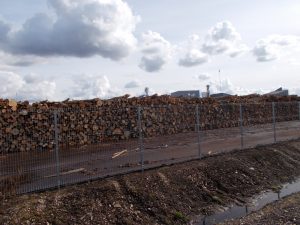Government urged to review subsidies already granted for wood burning in power plants
3rd September 2018 – Environmental campaigners welcome a new Government decision to rule out future subsidies for biomass power stations with greenhouse gas emissions above 29kg CO2 per megawatt hour, a dramatic 85% reduction from the current limit, which cannot be met by burning imported wood pellets. [1] However, they urge the government to review the subsidies already granted for burning millions of tonnes of pellets imported in UK power stations.
A coalition of UK and US NGOs had called for a tighter greenhouse gas limit in the consultation, and 1,500 individuals endorsed this call via an email alert by Biofuelwatch. The UK imports more wood pellets than any other country in the world and almost all of those are currently burned by Drax power station in Yorkshire. Two other large biomass power stations [2] are under development and have already been guaranteed subsidies, each of which will burn 1.5 million tonnes of imported pellets. Most of those pellets come from the southern US, where carbon-rich forests ecosystems in the heart of a global biodiversity hotspot are being clearcut, increasingly for making pellets which are then shipped to the UK. [3] Drax power station receives £2 million a day in subsidies for burning imported wood. [4]
In June 2018 the government response to Part A of the same consultation [4a] decided that ‘Dedicated biomass and energy from waste schemes are only eligible for Contract for Difference support if they are deployed with combined heat and power (CHP)’ and ‘have a minimum 70% overall efficiency (net calorific value)’ up from the current 35% threshold. See Press Release here
For more information on the subsidy changes see here
Almuth Ernsting from Biofuelwatch [5] states: “We are relieved that the Government has at last closed the door on new subsidies for burning imported wood for electricity because of the climate impacts. This comes after years of warnings by scientists and environmental organisations alike that burning pellets sourced from logging forests in North America and elsewhere is no better for the climate than burning coal. However, the Government must now go further and redirect existing biomass subsidies to low-carbon wind, solar and tidal power.”
Rita Frost from Dogwood Alliance in North Carolina, US [6], adds: “Southern US forests, and the communities that depend on them, have suffered from the UK’s misguided policy to subsidise biomass power stations. For the health and safety of our planet and communities, it’s imperative that we stop the unchecked growth of this dirty industry. Today’s decision is a positive signal for Southern forests, communities, and the climate. Now, we need to see an end to Drax’s £2m daily handouts for their destructive burning of forests.”
Mary Booth from the Partnership for Policy Integrity in the US [7] says: “Although the Government continues to use a flawed, unscientific method for calculating carbon emissions from biomass, it at least now acknowledges that the fossil fuel emissions from turning wood into pellets and shipping them across the Atlantic or across Europe alone are so high that electricity generated from burning those pellets is not low-carbon and does not merit subsidies. There is no excuse left for subsidising this destructive industry at all.”
—————————————–END——————————————–
Contacts:
· Almuth Ernsting, Biofuelwatch, Tel 0131-6232600 (UK)
· Rita Frost, Dogwood Alliance, Tel ++1 – 828-251-2525 ext. 26 (US)
· Mary Booth, Partnership for Policy Integrity, Tel: ++1 – 917-885-2573 (US)
Notes:
[1] The Government’s response to a consultation about Contracts for Difference (renewable electricity subsidies), issued today, can be found at assets.publishing.service.gov.uk/government/uploads/system/uploads/attachment_data/file/736640/Consultation_document.pdf . It states that such subsidies will in future only be awarded for burning biomass that does not result in more than 29kg CO2e/MWh greenhouse gas emissions – a reduction from the current 200.4 kg CO2/MWh. Although the Government’s methodology omits almost all of the emissions associated with logging as well as those from burning the wood, the fossil fuel emissions from processing and transporting wood pellets low distance alone are so high that no imported wood pellets have ever met this new limit.
[2] Those are MGT’s Teesside power station, currently under construction at Teesport, and the former Lynemouth coal power station, which is being converted to wood pellets.
[3] See dogwoodalliance.org/wp-content/uploads/2017/05/NRDC_2014-2017Booklet_DigitalVersion-resize.pdf for evidence about pellet sourcing by Enviva, the largest pellet producer in the US. Enviva is Drax’s biggest external pellet supplier and has signed a supply contract for the MGT Teesside power station.
[4] The £2 million per day subsidy figure is calculated from the figures presented by Drax in its 2017 Annual Report (drax.com/wp-content/uploads/2018/03/Drax-Group-plc-2017-annual-report.pdf ) and was confirmed by Drax in an email to Biofuelwatch.
[4a] http://www.biofuelwatch.org.uk/2018/cfd-announcement-pr/
[5] See biofuelwatch.org.uk
[6] See www.dogwoodalliance.org
[7] See www.pfpi.net

